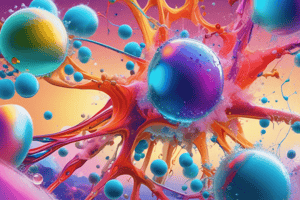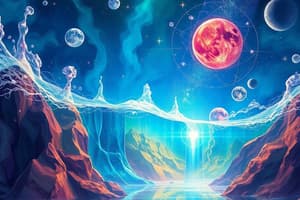Podcast
Questions and Answers
What is evaporation?
What is evaporation?
A vaporization that occurs only at the surface of a liquid.
What are the conditions that particles in a liquid must overcome in order to evaporate?
What are the conditions that particles in a liquid must overcome in order to evaporate?
They must overcome the attractive forces between them as well as the force of air pressure.
What is freezing?
What is freezing?
The opposite of melting, it is the change of state from a liquid to a gas.
What happens to the particles when a liquid changes to a solid?
What happens to the particles when a liquid changes to a solid?
What is condensation?
What is condensation?
Which of the following is NOT a sign of chemical change?
Which of the following is NOT a sign of chemical change?
What is a chemical change?
What is a chemical change?
What is a mixture?
What is a mixture?
Which of the following is a heterogeneous mixture?
Which of the following is a heterogeneous mixture?
What is a limiting factor?
What is a limiting factor?
What is biotic potential?
What is biotic potential?
What is carrying capacity?
What is carrying capacity?
What is overpopulation?
What is overpopulation?
What is a symbiotic relationship?
What is a symbiotic relationship?
What is parasitism?
What is parasitism?
What is mutualism?
What is mutualism?
What is a cooperative relationship?
What is a cooperative relationship?
What is a predator-prey relationship?
What is a predator-prey relationship?
What is an ecosystem?
What is an ecosystem?
What is the difference between an ecosystem and a community?
What is the difference between an ecosystem and a community?
What is a chemical reaction?
What is a chemical reaction?
What is a product in a chemical reaction?
What is a product in a chemical reaction?
What is a reactant in a chemical reaction?
What is a reactant in a chemical reaction?
What is a chemical property?
What is a chemical property?
Flashcards
Physical Change
Physical Change
A change in matter where the substance's identity remains the same, even though its physical properties might change.
Chemical Change
Chemical Change
A change in matter that results in the formation of new substances with different chemical and physical properties.
Chemical Reaction
Chemical Reaction
A process that involves the rearrangement of atoms and molecules, leading to the formation of new substances.
Reactants
Reactants
The starting substances in a chemical reaction.
Signup and view all the flashcards
Products
Products
The new substances formed as a result of a chemical reaction.
Signup and view all the flashcards
Chemical Property
Chemical Property
A characteristic of a substance that describes how it behaves during a chemical change.
Signup and view all the flashcards
Homogeneous Mixture
Homogeneous Mixture
A mixture where the components are evenly distributed and appear as a single substance.
Signup and view all the flashcards
Heterogeneous Mixture
Heterogeneous Mixture
A mixture where the components are not evenly distributed and can be easily distinguished.
Signup and view all the flashcards
Distillation
Distillation
The process of separating components of a mixture based on differences in their boiling points.
Signup and view all the flashcards
Filtration
Filtration
The process of separating solid particles from a liquid by passing the mixture through a filter.
Signup and view all the flashcards
Ecosystem
Ecosystem
A community of interacting organisms and their physical environment.
Signup and view all the flashcards
Biosphere
Biosphere
The sum of all ecosystems on Earth.
Signup and view all the flashcards
Population
Population
All individuals of the same species living in a particular area at the same time.
Signup and view all the flashcards
Community
Community
A group of different species living together in a particular area.
Signup and view all the flashcards
Limiting Factor
Limiting Factor
Anything that restricts the size of a population.
Signup and view all the flashcards
Biotic Potential
Biotic Potential
The maximum potential growth rate of a population under ideal conditions with no limiting factors.
Signup and view all the flashcards
Carrying Capacity
Carrying Capacity
The maximum number of individuals of a species that an ecosystem can sustainably support over time.
Signup and view all the flashcards
Commensalism
Commensalism
A relationship between two organisms where one organism benefits from the relationship, while the other is neither harmed nor benefited.
Signup and view all the flashcards
Parasitism
Parasitism
A relationship where one organism benefits at the expense of another.
Signup and view all the flashcards
Mutualism
Mutualism
A relationship where both interacting species benefit from the relationship.
Signup and view all the flashcards
Biotic Factors
Biotic Factors
Living organisms, such as plants, animals, and people.
Signup and view all the flashcards
Abiotic Factors
Abiotic Factors
Nonliving parts of an environment, such as sunlight, water, soil, and rocks.
Signup and view all the flashcardsStudy Notes
Evaporation
- Evaporation is a vaporization process occurring only at a liquid's surface.
- Particles overcome attractive forces and air pressure to evaporate.
- The process requires the particles to gain enough energy to overcome forces.
Freezing
- Freezing is the change of state from liquid to solid.
- It requires the removal of thermal energy.
- As thermal energy is removed, particles slow down and have less energy to overcome attractive forces.
- This leads to the formation of an organized structure (solid).
Condensation
- Condensation is the change of state from gas to liquid.
- It involves the removal of thermal energy from a gas.
- Slower-moving particles in the gas cannot overcome attractive forces with surrounding particles.
- This causes them to clump together forming a liquid.
Chemical Change
- A chemical change is a change in matter where the substance transforms into new substances with different physical properties.
- Indicators of a chemical change include color change and odor change.
Population Size
- Population size can increase but also decrease.
- Example: Field mice population decreases in winter due to less food.
- Natural disasters (floods, fires, volcanic eruptions) impact population size.
- Certain population sizes can decrease to a point threatening the entirety of the species.
Changes of State
- From gas to liquid: condensation
- From solid to gas: sublimation
- The number of particles remains the same during a change of state.
- The mass of the matter is unchanged during a change of state.
Physical Change
- A physical change alters one or more physical properties of a substance.
- The substance's identity stays the same.
Examples of Physical Change
- Breaking glass
- Mixing candies
- Shredding paper
- Folding paper
- Melting ice
Involved in Changing State
- Transferring energy to/from a substance changes the state.
- A form of this energy is thermal energy/heat.
Changing State of Matter
- Melting: solid to liquid
- Evaporation: liquid to gas
- Freezing: liquid to solid
Mixtures
- A mixture is matter that varies in composition.
- Types of mixtures:
- Heterogeneous: substances are not evenly mixed (e.g., fruit salad).
- Homogeneous: substances are evenly mixed (e.g., tea with sugar).
- Methods for separating mixtures:
- Mechanical separation
- Filtration
- Evaporation
- Magnetism
- Separation funnel
- Distillation
Ecology - Symbiosis
- Symbiosis: a close long-term relationship between two species.
- Types of symbiotic relationships:
- Commensalism: one species benefits, the other is unaffected.
- Parasitism: one species benefits, the other is harmed.
- Mutualism: both species benefit.
Ecology - Limiting Factors
- Limiting factors restrict population size.
- Examples of limiting factors:
- Water
- Food
- Sunlight
- Temperature
- Space/shelter
Ecology - Biotic Potential
- Biotic potential: the potential growth of a population under ideal conditions (no limiting factors).
Ecology - Carrying Capacity
- Carrying capacity is the largest number of individuals of a species an environment can support.
Overpopulation
- Overpopulation occurs when a population size becomes so large it damages the environment.
Studying That Suits You
Use AI to generate personalized quizzes and flashcards to suit your learning preferences.




